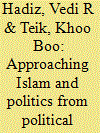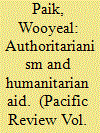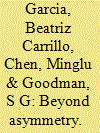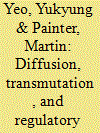|
|
|
Sort Order |
|
|
|
Items / Page
|
|
|
|
|
|
|
| Srl | Item |
| 1 |
ID:
106787


|
|
|
|
|
| Publication |
2011.
|
| Summary/Abstract |
The article traces the trajectories of Islamic politics in Indonesia and Malaysia in relation to the changing political economy of these two countries. The approach adopted is to understand Islamic politics less on the basis of Islamic doctrine, or conflicts over its interpretation, than in connection with the changing social bases of politics, the context established by capitalist economic transformations, the evolution of the post-colonial state from the Cold War and its aftermath, and of crises of political economy in the 1980s and 1990s. The exercise reveals important convergences and divergences in trajectories that help to explain the complex historical processes which have shaped Islamic politics in these two cases and possibly beyond. It also reveals the entanglement of Islamic politics in very profane conflicts over power and tangible economic resources over time. In both countries a new form of Islamic populism has emerged as a major articulator of grievances against the secular state and perceived social injustices. However, the same historical processes have enabled the social agents of Islamic politics in Malaysia to contest state power more effectively than their counterparts in Indonesia.
|
|
|
|
|
|
|
|
|
|
|
|
|
|
|
|
| 2 |
ID:
106786


|
|
|
|
|
| Publication |
2011.
|
| Summary/Abstract |
Severe natural disasters encourage the international community to donate humanitarian aid (materials and personnel) to the affected country, which is critical for its human security. Some authoritarian regimes, however, rationally reject such aid despite the dire situation of their people. When an authoritarian regime decides whether to accept foreign humanitarian aid for severe natural disasters or not, it considers two political factors: (1) the risk and (2) the need to accept aid, which is a type of exogenous shock that may threaten the stability of the regime and its survival. This paper considers the factors of risk (regime type, domestic struggle, and international pressure) as inherent and contingent determinants of regime stability, and the need factors by looking at the different types of sources from which the regime gains its legitimacy (electoral mandate, economic development, or ideology). If the risk is less and the need is more, the regime is more likely to accept the aid, otherwise not. The two authoritarian regimes hit by severe natural disasters - the 2008 Sichuan earthquake in China and the 2008 Cyclone Nargis-caused floods in Myanmar - are considered as salient cases for the external variation between authoritarian regimes. This paper also finds some critical internal variation within an authoritarian regime and its differing responses during the 2008 Sichuan earthquake and two other disasters - the 1976 Tangshan earthquake and the 2010 Qinghai earthquake.
|
|
|
|
|
|
|
|
|
|
|
|
|
|
|
|
| 3 |
ID:
106785


|
|
|
|
|
| Publication |
2011.
|
| Summary/Abstract |
Academic commentary has long emphasised the asymmetry in Mexico-China relations. In particular, much attention has focussed since the early 1990s particularly from the Mexican side on the economic imbalance in trade and investment that has become and remains acute with the expansion of the economy of the People's Republic of China. This is though far from the only sense in which the relationship between the two countries is asymmetrical. There is also a severe imbalance in the relative importance of politics and economics as determinants of this relationship for both China and Mexico. The Mexican Government seems to be more concerned with its economic relationship with China. In contrast, the PRC Government seems more concerned with its political relationship with Mexico. Moreover, there is a further asymmetry in the respective significance that each appears to have to the other as a partner. Mexico plays a small role in China's outlook but China looms large in Mexico's worldview. Identification of a number of cross-cutting asymmetrical relationships suggests that a bilateral perspective may not be the most effective for understanding the interaction or potential interaction between Mexico and China. On the contrary, there is more logic to the elements of cooperation and conflict between Mexico and China when their relationship is viewed in the wider, multilateral context of globalisation.
|
|
|
|
|
|
|
|
|
|
|
|
|
|
|
|
| 4 |
ID:
106783


|
|
|
|
|
| Publication |
2011.
|
| Summary/Abstract |
Marketization and state restructuring are proceeding apace in China and Vietnam. China and Vietnam are not, however, converging upon the global regulatory model, even allowing for customary national variations. Rather, they are building up distinctive forms of regulatory regimes aiming to maintain the party-state's control over key state sectors, while at the same time integrating with the global economy and conforming to international norms and standards. This study argues that the regulatory model being adopted in Vietnam and China is the product of a specific kind of transition from a command to a market economy within an authoritarian political regime. While diffusion theories are of use in identifying external driving forces for the reform effort, these theories are of limited value for unveiling the dynamics of local contexts. Indigenous incentives, opportunity structures, and the experimental nature of public policy explain why, despite their exposure to global reform movements and commitment to multilateral institutions, China and Vietnam are likely to end up not with just a variety of the same regulatory regime, but a different one. The case of telecommunications regulation is used to illustrate this.
|
|
|
|
|
|
|
|
|
|
|
|
|
|
|
|
| 5 |
ID:
106788


|
|
|
|
|
| Publication |
2011.
|
| Summary/Abstract |
The Bush Administration's 'war on terror' was both a set of policies as well as a powerful security narrative that informed the way that threat was understood and constructed post-9/11. This idea is explored specifically with regard to how the articulation of threat in the 'war on terror' informed American relations with Southeast Asia, which in turn had active consequences for regional state and non-state actors alike. The importance of discourse is explained with a focus on how the discursive construction of threat within the 'war on terror' security narrative is intrinsic to the 'security project' of the American state, as well as to American national identity more generally (Campbell 1998, Jackson 2005). From this analytical perspective, this paper contends that irruptions of the Bush Administration's post-9/11 foreign policy discourse in Southeast Asia were observable, and that these manifestations of discursive construction engendered consequences that contributed to an increase in anti-Americanism and terrorist activities aimed at 'Western' targets, and to a proliferation of anti-democratic and repressive behaviors by Southeast Asian governments under the guise of anti-terror measures.
|
|
|
|
|
|
|
|
|
|
|
|
|
|
|
|
| 6 |
ID:
106784


|
|
|
|
|
| Publication |
2011.
|
| Summary/Abstract |
Official sources and the media often represent the 'Abu Sayyaf' as a militant Islamist group or organization responsible for most atrocities in the southwestern Philippines. Frequently implicit within such representations is the assumption that the reported terrorist/bandit entity possesses the basic features of a conventional organization. Yet this assumption is irreconcilable with the many available descriptions of the armed groups labelled 'Abu Sayyaf' since the early 1990s. To resolve this incongruity, the article examines reigning perceptions of the 'Abu Sayyaf' in light of organization theory and network analysis. It begins with a summary of conventional definitions of organizations, before identifying alternative conceptual aids useful for understanding the phenomenon known as the 'Abu Sayyaf'. It then teases out the presuppositions that underpin popular views of the phenomenon through a sample of early military and rebel depictions. It compares those presuppositions with the structural features of the armed coalitions involved in two mass kidnappings attributed to the 'Abu Sayyaf'. The remainder of the article analyzes the 'Abu Sayyaf' in terms of 'dark' or illegal networks and supporting concepts from organization theory. To dispel the confusion surrounding the phenomenon, the article reviews the genealogy of the 'Abu Sayyaf' label in order to reveal the circumstances that gave birth to the perception of it as being a coherent group or organization. The article concludes with a brief ideal-typical interpretation of the covert networks in which the armed groups branded 'Abu Sayyaf' have been and continue to be enmeshed.
|
|
|
|
|
|
|
|
|
|
|
|
|
|
|
|
|
|
|
|
|